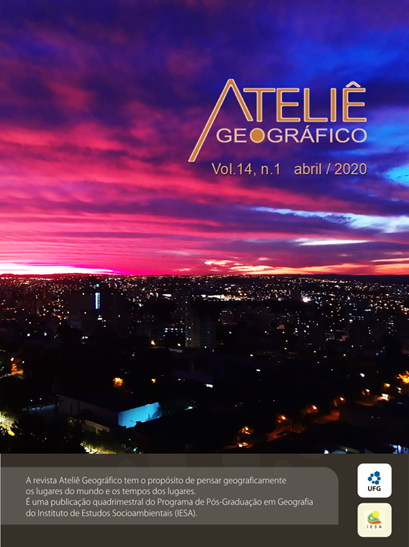A construção da temporalidade e as novas sensibilidades em Goiânia: Imaginário e Literatura
DOI:
https://doi.org/10.5216/ag.v14i2.54666Resumo
Goiânia consistiu na experiência de criação da cidade planejada como a transformação espacial, completa e simultânea, independente da diacronia, no contexto do seu surgimento. Contudo, hoje o desenho e mesmo seu plano há muito já se transformaram e não mais correspondem às ideias originais. Buscamos compreender tais transformações a partir da construção da temporalidade que vai alterando o sentido das paisagens, promovendo rupturas com as formas que as engendraram e o surgimento de novas imagens e sensibilidades urbanas, sobretudo advindas da literatura e da arte. A construção da temporalidade opera uma transformação nas paisagens de Goiânia em paisagens imaginárias que surgiram sob o signo de serem formas espaciais, ambientais, urbanísticas, arquitetônicas, artísticas e culturais; inclusive, aquelas advindas de processos preservação do passado e da valorização da memória urbana.
Palavras-chave: cidades planejadas, paisagem urbana, poesia.
Downloads
Downloads
Publicado
Como Citar
Edição
Seção
Licença
Autores que publicam nesta revista concordam com os seguintes termos:- Autores mantém os direitos autorais e concedem à revista o direito de primeira publicação, com o trabalho simultaneamente licenciado sob a Licença Creative Commons Attribution que permite o compartilhamento do trabalho com reconhecimento da autoria e publicação inicial nesta revista.
- Os autores não serão remunerados pela publicação de trabalhos na Revista Ateliê Geográfico. Além disso, os conteúdos publicados são de inteira e exclusiva responsabilidade de seus autores, ainda que reservado aos editores o direito de proceder a ajustes textuais e de adequação às normas da publicação.
- Autores têm permissão e são estimulados a divulgar seu trabalho online (ex.: em repositórios institucionais ou na sua página pessoal), já que isso pode gerar alterações produtivas, bem como aumentar o impacto e a citação do trabalho publicado (Veja O Efeito do Acesso Livre).


